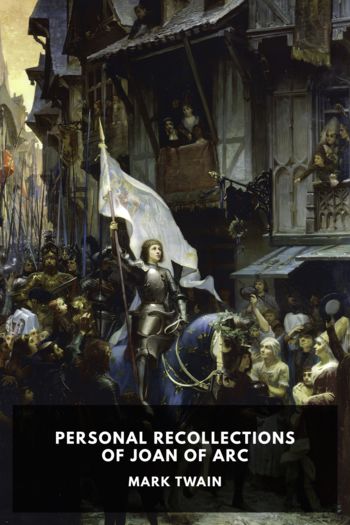A Connecticut Yankee in King Arthur’s Court by Mark Twain (my reading book .TXT) 📕

- Author: Mark Twain
Book online «A Connecticut Yankee in King Arthur’s Court by Mark Twain (my reading book .TXT) 📕». Author Mark Twain
I found the water some three hundred yards away, and had been resting about twenty minutes, when I heard voices. That is all right, I thought—peasants going to work; nobody else likely to be stirring this early. But the next moment these comers jingled into sight around a turn of the road—smartly clad people of quality, with luggage-mules and servants in their train! I was off like a shot, through the bushes, by the shortest cut. For a while it did seem that these people would pass the king before I could get to him; but desperation gives you wings, you know, and I canted my body forward, inflated my breast, and held my breath and flew. I arrived. And in plenty good enough time, too.
“Pardon, my king, but it’s no time for ceremony—jump! Jump to your feet—some quality are coming!”
“Is that a marvel? Let them come.”
“But my liege! You must not be seen sitting. Rise!—and stand in humble posture while they pass. You are a peasant, you know.”
“True—I had forgot it, so lost was I in planning of a huge war with Gaul”—he was up by this time, but a farm could have got up quicker, if there was any kind of a boom in real estate—“and right-so a thought came randoming overthwart this majestic dream the which—”
“A humbler attitude, my lord the king—and quick! Duck your head!—more!—still more!—droop it!”
He did his honest best, but lord, it was no great things. He looked as humble as the leaning tower at Pisa. It is the most you could say of it. Indeed, it was such a thundering poor success that it raised wondering scowls all along the line, and a gorgeous flunkey at the tail end of it raised his whip; but I jumped in time and was under it when it fell; and under cover of the volley of coarse laughter which followed, I spoke up sharply and warned the king to take no notice. He mastered himself for the moment, but it was a sore tax; he wanted to eat up the procession. I said:
“It would end our adventures at the very start; and we, being without weapons, could do nothing with that armed gang. If we are going to succeed in our emprise, we must not only look the peasant but act the peasant.”
“It is wisdom; none can gainsay it. Let us go on, Sir Boss. I will take note and learn, and do the best I may.”
He kept his word. He did the best he could, but I’ve seen better. If you have ever seen an active, heedless, enterprising child going diligently out of one mischief and into another all day long, and an anxious mother at its heels all the while, and just saving it by a hair from drowning itself or breaking its neck with each new experiment, you’ve seen the king and me.
If I could have foreseen what the thing was going to be like, I should have said, No, if anybody wants to make his living exhibiting a king as a peasant, let him take the layout; I can do better with a menagerie, and last longer. And yet, during the first three days I never allowed him to enter a hut or other dwelling. If he could pass muster anywhere during his early novitiate it would be in small inns and on the road; so to these places we confined ourselves. Yes, he certainly did the best he could, but what of that? He didn’t improve a bit that I could see.
He was always frightening me, always breaking out with fresh astonishers, in new and unexpected places. Toward evening on the second day, what does he do but blandly fetch out a dirk from inside his robe!
“Great guns, my liege, where did you get that?”
“From a smuggler at the inn, yester eve.”
“What in the world possessed you to buy it?”
“We have escaped diverse dangers by wit—thy wit—but I have bethought me that it were but prudence if I bore a weapon, too. Thine might fail thee in some pinch.”
“But people of our condition are not allowed to carry arms. What would a lord say—yes, or any other person of whatever condition—if he caught an upstart peasant with a dagger on his person?”
It was a lucky thing for us that nobody came along just then. I persuaded him to throw the dirk away; and it was as easy as persuading a child to give up some bright fresh new way of killing itself. We walked along, silent and thinking. Finally the king said:
“When ye know that I meditate a thing inconvenient, or that hath a peril in it, why do you not warn me to cease from that project?”
It was a startling question, and a puzzler. I didn’t quite know how to take hold of it, or what to say, and so, of course, I ended by saying the natural thing:
“But, sire, how can I know what your thoughts are?”
The king stopped dead in his tracks, and stared at me.
“I believed thou wert greater than Merlin; and truly in magic thou art. But prophecy is greater than magic. Merlin is a prophet.”
I saw I had made a blunder. I must get back my lost ground.





Comments (0)